When making a film, choosing the right camera is a very important decision for filmmakers. There are many camera options for filmmaking, each with different features and capabilities. That becomes both exciting and daunting.
If you’re an experienced filmmaker or a beginner, this guide will help you choose a camera. Let’s explore important factors, technical details, and creative options in choosing cameras. This will help you choose based on your filmmaking goals and budget.
So, let’s go on a cinematic adventure and find the perfect camera for your filmmaking dreams.
Contents
- 1 What Film Camera Should I Buy?
- 1.1 Step 1: Define Your Purpose
- 1.2 Step 2: Consider Your Budget
- 1.3 Step 3: Film Format
- 1.4 Step 4: Condition and Brand
- 1.5 Step 5: Additional Features
- 1.6 Step 6: Do Your Research
- 1.7 Step 7: Try Before You Buy
- 1.8 Step 8: Invest in Accessories
- 1.9 Filmmaking Cameras Price list
- 1.10 How To Choose A Camera For Low-Budget Filmmaking
- 1.11 Cheapest 4k Camera For Filmmaking
- 1.12 Best Mirrorless Camera For Filmmaking
- 1.13 Best Camera for Filmmaking on a Budget
- 1.14 Final Say:
What Is a Film Camera?
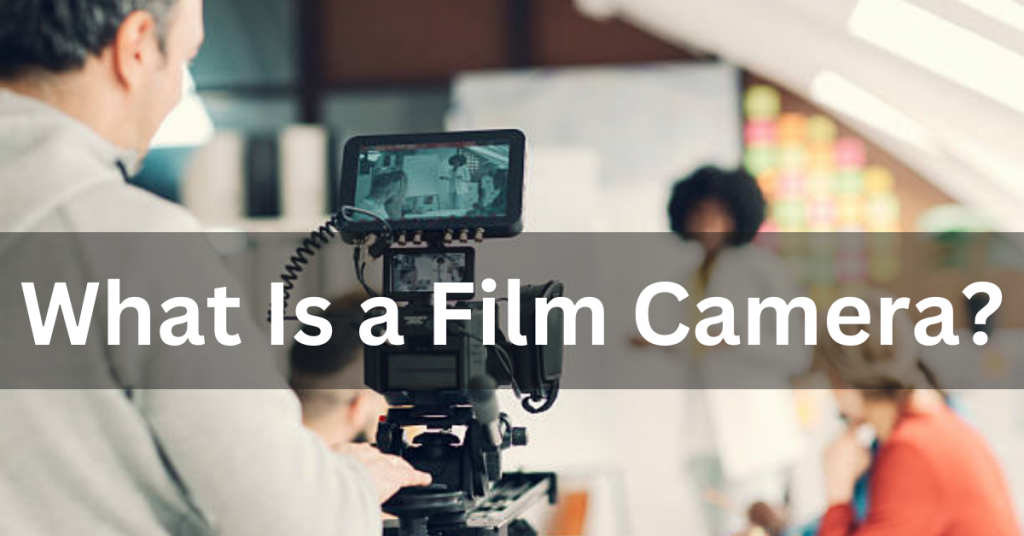
One definition of a “film camera” is a camera that utilizes an image sensor. Film cameras may use either manual or automatic controls. Manual film cameras allow the user to adjust. These settings include aperture, shutter speed, and focus.
Automatic film cameras have sensors. The camera’s parameters are modified according to the lighting circumstances. This kind of camera is commonly used by those who are just starting out in photography. Professional photographers prefer to use manual film cameras. Because it will give them greater say over the finished product.
Types Of Film Cameras
You may choose from a wide variety of film cameras nowadays. It is unique. With its own unique set of capabilities, it is. Now I’m sharing. Here is a look at some of the most popular types of film cameras:
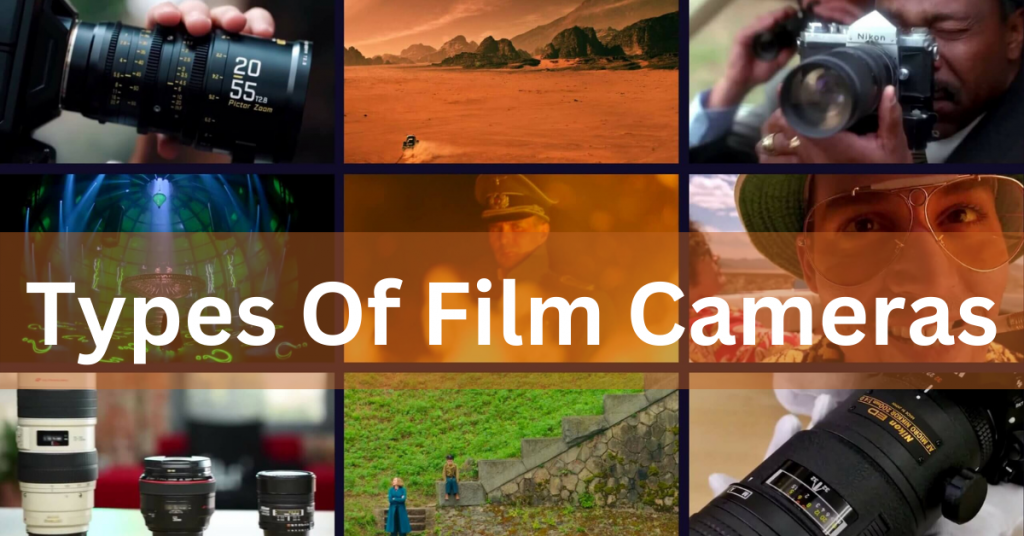
01. 35mm Cameras: The most common type of film camera. They’re great for both beginning and experienced photographers. They offer a variety of features and options, and they are affordable.
Medium Format Cameras: These cameras are designed for professional photographers. Who needs the highest-quality images possible? They are more expensive than 35mm cameras. They offer a larger image sensor and higher-quality lenses.
Large Format Cameras: These massive cameras are used by commercial photographers and artists. They offer the largest image sensors and the highest-quality lenses. They are also the most expensive type of camera on the market.
What Film Camera Should I Buy?
Film photography has experienced a resurgence in recent years, attracting both seasoned photographers and newcomers eager to explore the magic of analog photography. If you’re contemplating buying a film camera but are unsure which one to choose, this guide will help you navigate the myriad of options and make an informed decision based on your preferences, budget, and goals.
Step 1: Define Your Purpose
The first step in choosing a film camera is to clearly define your purpose for using it. Are you looking for a camera to capture everyday moments, experiment with artistic photography, or dive into professional film photography? Your intended use will influence the type of camera you should consider.
- Everyday Photography: If you want a simple, point-and-shoot camera for casual photography, compact 35mm film cameras like the Olympus Stylus Epic or Canon Sure Shot are great options.
- Artistic Expression: If you’re interested in creative and experimental photography, a manual SLR (Single Lens Reflex) camera, like the Nikon FM2 or Pentax K1000, provides more control over settings.
- Professional Film Photography: For serious film enthusiasts or professionals, medium format cameras such as the Hasselblad 500CM or large format cameras offer unparalleled image quality and control.
Step 2: Consider Your Budget
Your budget plays a significant role in determining the type of film camera you can afford. Film cameras vary widely in price, so it’s important to establish your budget range early in the process.
- Entry-Level Cameras: Basic 35mm point-and-shoot cameras are typically the most budget-friendly options, ranging from $50 to $200.
- Mid-Range Cameras: Manual 35mm SLR cameras can be found in the $200 to $500 range, offering more control and quality.
- Professional Cameras: Medium format and large format cameras can range from $500 to several thousand dollars, depending on the brand and condition.
Remember that in addition to the camera body, you’ll need to budget for film, lenses (if applicable), and processing costs.
Step 3: Film Format
Film comes in various formats, each offering its unique characteristics. The most common formats are 35mm, medium format (120/220), and large format (4×5 and beyond). Consider the format that aligns with your creative vision and budget:
- 35mm: Widely available, compact, and affordable, 35mm is perfect for everyday shooting and experimentation.
- Medium Format: Offers superior image quality, larger negatives, and more control but can be bulkier and more expensive.
- Large Format: Provides unparalleled detail and control but is the most expensive and cumbersome option, typically reserved for professionals.
Step 4: Condition and Brand
When buying a film camera, especially vintage or used models, consider the camera’s condition and the reputation of the brand. Research the reliability and availability of replacement parts if needed.
Popular and reputable film camera brands include Nikon, Canon, Pentax, Leica, Hasselblad, and Rollei, among others.
Step 5: Additional Features
Depending on your preferences, you may want to consider additional features like autofocus, built-in light meters, interchangeable lenses, and motor drives. These features can enhance your shooting experience but may also add to the cost.
Step 6: Do Your Research
Before making a final decision, thoroughly research potential camera models. Read reviews, watch video tutorials, and seek advice from experienced film photographers. Online forums and communities dedicated to film photography can provide valuable insights and recommendations.
Step 7: Try Before You Buy
Whenever possible, handle the camera in person before purchasing it. Check the condition, shutter speed accuracy, and overall functionality. If buying online, ensure the seller has a good reputation and offers a return policy.
Step 8: Invest in Accessories
Don’t forget to budget for essential accessories like film, lenses, a camera bag, a tripod, and any other gear you may need. These accessories are essential for a complete film photography setup.
In conclusion, choosing the right film camera is a personal journey that depends on your photography goals, budget, and preferences. Take your time, do your research, and enjoy the process of rediscovering the timeless art of film photography. Whether you opt for a vintage classic or a modern film camera, the joy of capturing moments on film is a rewarding experience that can enhance your photographic skills and creativity.
Filmmaking Cameras Price list
Please note that prices can vary significantly based on the brand, model, and additional accessories.
01.Entry-Level Cameras (Under $1,000)
| Camera Model | Price Range ($) | Notes |
|---|---|---|
| Canon EOS M50 | $500 – $700 | Popular for vlogging and beginner filmmakers. |
| Panasonic Lumix G7 | $500 – $700 | Offers 4K video at an affordable price. |
| Sony Alpha a6400 | $800 – $1,000 | Excellent autofocus and compact design. |
02.Mid-Range Cameras ($1,000 – $2,500)
| Camera Model | Price Range ($) | Notes |
|---|---|---|
| Blackmagic Pocket Cinema Camera 4K | $1,295 – $1,495 | High-quality cinema camera for budget-conscious filmmakers. |
| Sony Alpha a7 III | $1,800 – $2,000 | Full-frame mirrorless camera with 4K video. |
| Panasonic Lumix GH5 | $1,500 – $2,000 | Ideal for versatile video shooting. |
03.Professional Cameras ($2,500 – $10,000+)
| Camera Model | Price Range ($) | Notes |
|---|---|---|
| Canon C100 Mark II | $4,000 – $5,000 | Popular among indie filmmakers and documentary producers. |
| RED DSMC2 HELIUM 8K | $20,000+ | High-end cinema camera used in Hollywood productions. |
| Sony FX9 | $10,000+ | Full-frame 6K camera with advanced features. |
04.Specialized Cameras (Varies)
| Camera Model | Price Range ($) | Notes |
|---|---|---|
| DJI Ronin 4D | Varies | A professional gimbal camera system for cinematic shots. |
| GoPro Hero 10 | $400 – $500 | Compact action camera for extreme filmmaking. |
| iPhone 13 Pro Max | $1,000+ | High-quality smartphone with advanced video capabilities. |
Please keep in mind that these price ranges are approximate, and the actual prices may change over time due to market fluctuations and new product releases. Additionally, filmmaking often involves investing in lenses, accessories, and post-production equipment, so consider the overall cost of your filmmaking setup when budgeting for your camera.
How To Choose A Camera For Low-Budget Filmmaking
When it comes to choosing a camera for low-budget filmmaking, there are a few things you need to take into account.
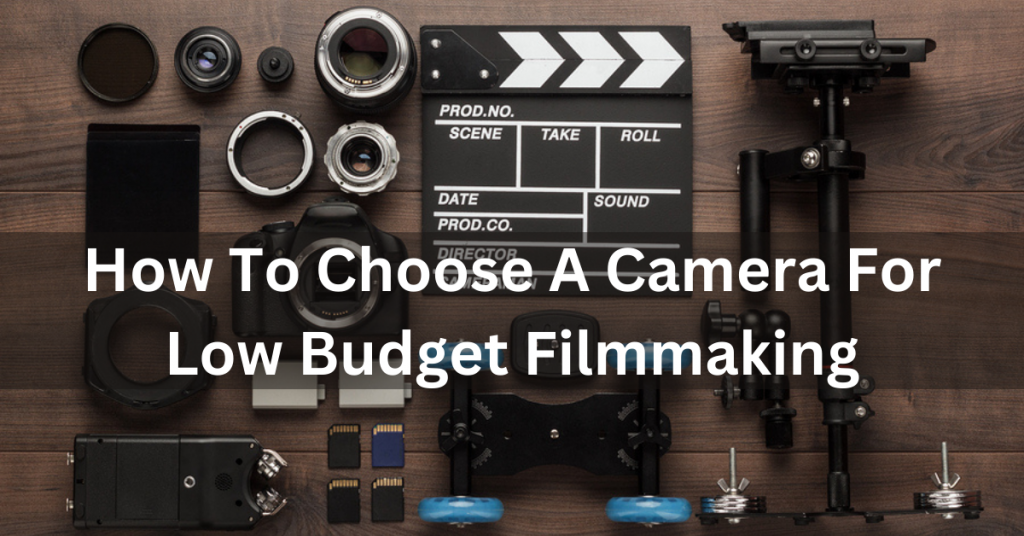
The first is the sensor size. A larger sensor will give you better image quality, but it will also be more expensive. A camera with a tiny sensor can be a good option if you have a restricted budget.
The lens are the next item to think about. You’ll need a good selection of lenses if you want to be able to shoot different types of scenes. Again, this will be more expensive, but it’s worth it if you want to get the most out of your camera.
Finally, you need to think about accessories. A good tripod, for example, can make a big difference in the quality of your footage.
A lot of the other features may be out of reach if money is limited. Try to get the essentials that you need to produce great results.
Cheapest 4k Camera For Filmmaking
4k cameras are becoming more and more popular for filmmaking and gaming video, but they can be quite expensive. There are a few alternatives to think about if you want the least expensive 4k camera for filming movies.
The Panasonic Lumix GH5, which can record 4K video at 60 frames per second, is an excellent choice. In addition to being small and lightweight, it takes up little space on set.
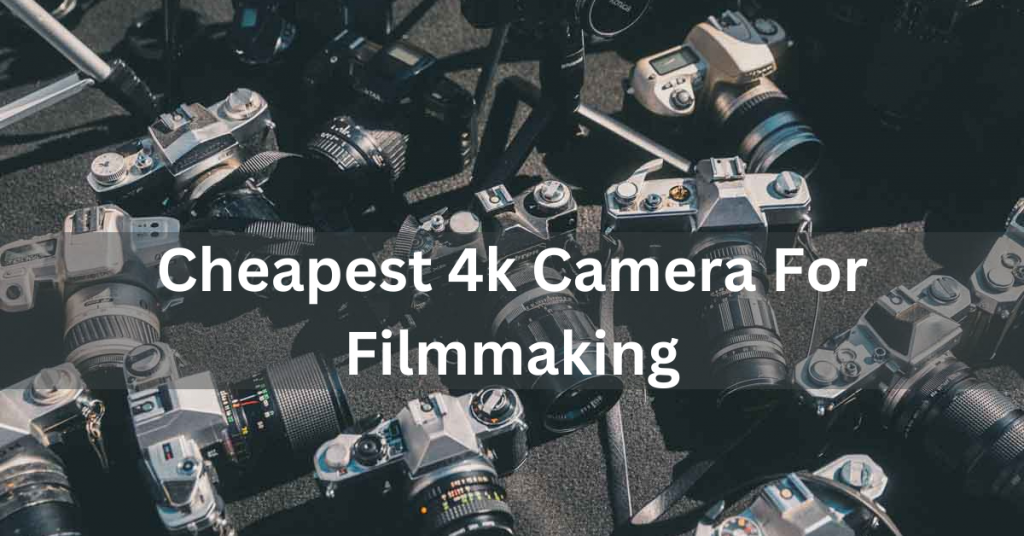
Another excellent choice is the Canon EOS R, which is capable of recording 4k video at 30 frames per second. It’s a bit larger and heavier than the GH5, but it has a full-frame sensor, which gives you better image quality.
The Sony A7III is a fantastic all-around camera with 4K video recording at 24 frames per second. It’s a bit more expensive than the other two options, but it has a higher-end sensor and autofocus system.
Whichever camera you choose, make sure to test it out before you commit to using it for your film project.
Best Mirrorless Camera For Filmmaking
If you’re in the market for a new camera, you may be wondering if a mirrorless camera is the right choice for you. There are several reasons why mirrorless cameras are perfect for filming. To begin with, these cameras are far more portable and lightweight than their DSLR counterparts.
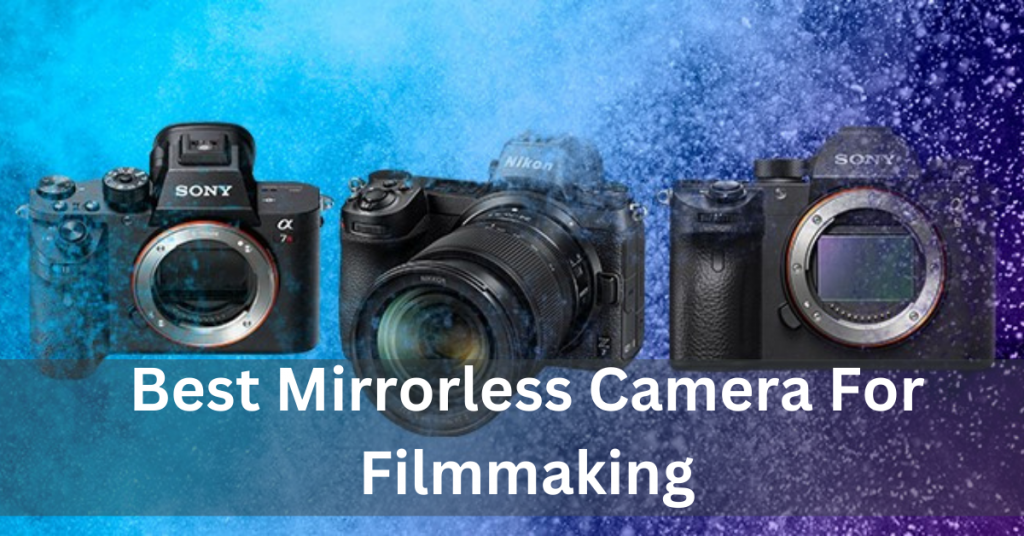
They can be carried and moved about with little effort. Additionally, their shutter lag times are quicker. Which is important for capturing fast-moving action? Mirrorless cameras offer a wider range of lenses and accessories. This will provide you greater leeway in terms of artistic expression in your photographs.
Best Camera for Filmmaking on a Budget
There are a lot of best cameras out there that can be used for video on a budget. However, not all of them are created equal. When making a low-budget movie, there are a number of things to think about when choosing the best camera.
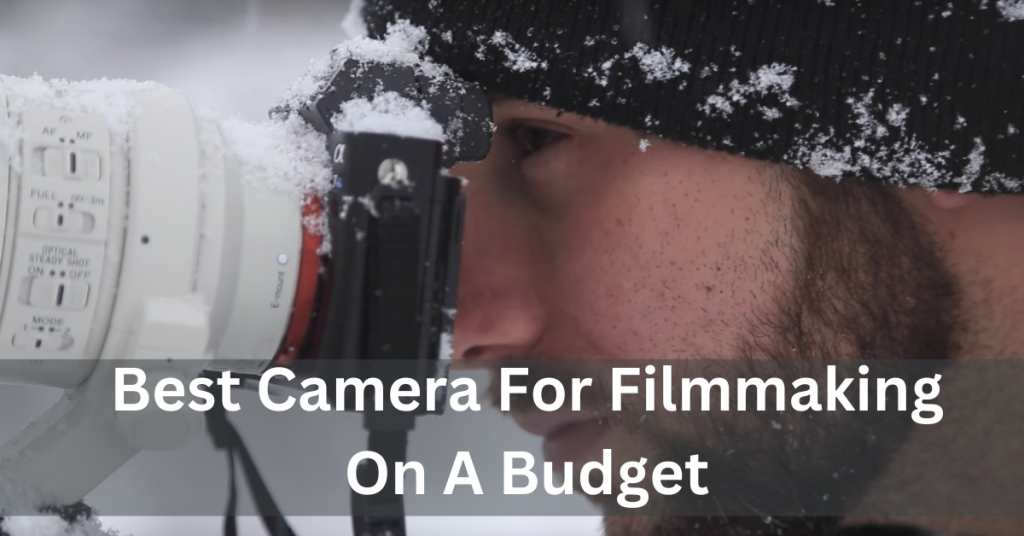
In the first place, how much money do you have? There are several fantastic cameras that won’t break the bank. When working with a smaller budget, you have to be pickier about what you buy.
Second, what type of film do you want to make? If you’re interested in making documentaries or music videos.
For example, you’ll need a different type of camera than if you’re wanting to make feature films.
Third, what is your level of experience? If you’re a beginner, you’ll want to find a camera that is easy to use and doesn’t require a lot of expensive accessories.
After giving it some thought, that is. You’ll be able to zero down on the ideal camera for your requirements.
READ : Why Does The Front Camera Flip The Picture – General Guide
Final Say:
To sum up, choosing the right camera for making films is a personal process. It requires considering various factors. We considered money limits, technology needs, artistic choices, and changing film technology. Ultimately, the answer to the question, “Which camera should I buy for filmmaking?” will vary for each filmmaker, as it depends on your unique vision and requirements.
Remember, the camera matters, but your storytelling and dedication determine your success. As you start making movies, try new things, improve your skills, and be creative. Keep up with the latest filmmaking technology. The camera you need may change tomorrow. No matter the camera, what matters most is the story and emotions you capture.
Go forth with the knowledge gained from this exploration. Let your chosen camera be your steadfast companion on your cinematic journey. It will help you capture the world as only you see it and share your unique perspective. Happy filmmaking!


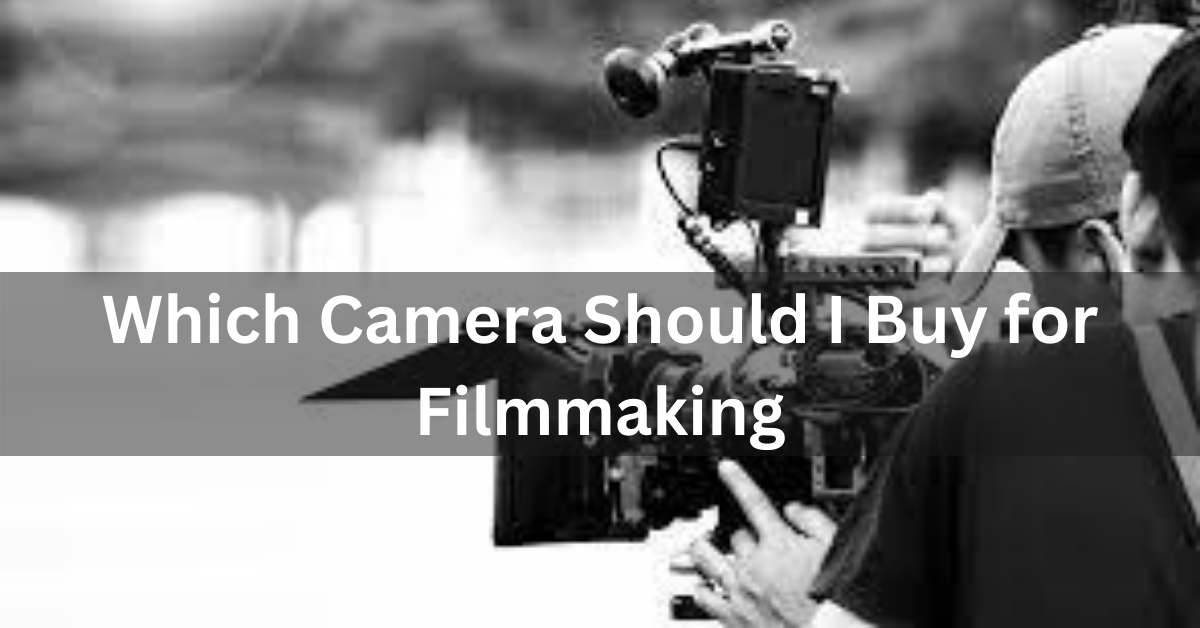
6 thoughts on “Which Camera Should I Buy for Filmmaking: A Filmmaker’s Guide!”